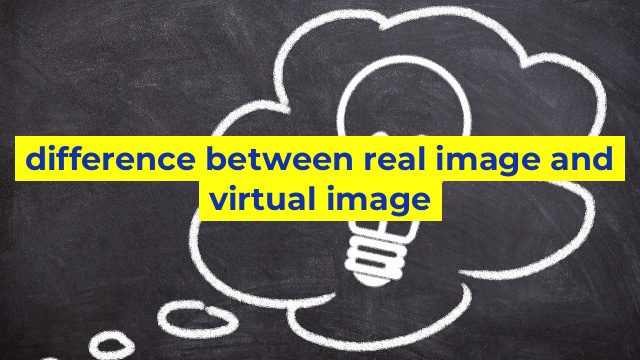Difference Between Real Image and Virtual Image
When it comes to the world of optics and imaging, there are two types of images that are commonly discussed. These are real images and virtual images. Although they may sound similar, they are actually quite different from one another. In this article, we will be discussing the differences between real images and virtual images.
What is a Real Image?
A real image is an image that can be projected onto a screen or observed directly. This type of image is formed when light rays converge at a point, resulting in an image that is inverted and can be projected onto a screen. Examples of real images include those seen through a microscope or telescope, as well as the images projected by a movie projector.
What is a Virtual Image?
A virtual image is an image that cannot be projected onto a screen or observed directly. This type of image is formed when light rays appear to be diverging from a point, resulting in an image that appears to be behind the mirror or lens. Virtual images are always upright and appear to be larger, smaller, or the same size as the object that is being viewed. Examples of virtual images include those seen in a mirror or camera lens.
Key Differences between Real Image and Virtual Image
The key differences between real images and virtual images are as follows:
1. Appearance – Real images appear to be inverted and can be projected onto a screen, while virtual images are always upright and cannot be projected onto a screen.
2. Formation – Real images are formed when light rays converge at a point, while virtual images are formed when light rays appear to be diverging from a point.
3. Location – Real images are located in front of the mirror or lens, while virtual images are located behind the mirror or lens.
4. Size – Real images can be either larger or smaller than the object being viewed, while virtual images always appear to be the same size as the object being viewed.
Conclusion
In conclusion, real images and virtual images are two types of images that are commonly discussed in optics and imaging. Although they sound similar, they are quite different from one another in terms of their appearance, formation, location, and size. Understanding these differences is important in fields such as microscopy, astronomy, and photography where the distinction between real and virtual images plays an important role.
Table difference between real image and virtual image
| Real Image | Virtual Image |
|---|---|
| Forms when light rays converge | Forms when light rays appear to converge |
| Can be projected onto a screen | Cannot be projected onto a screen |
| Can be captured by a camera | Cannot be captured by a camera |
| Real and inverted | Virtual and upright |
| Image is on the opposite side of the lens from the object | Image is on the same side of the lens as the object |
| Occurs when an object is placed beyond the focal point of a convex lens | Occurs when an object is placed between the focal point and the lens of a convex lens |
